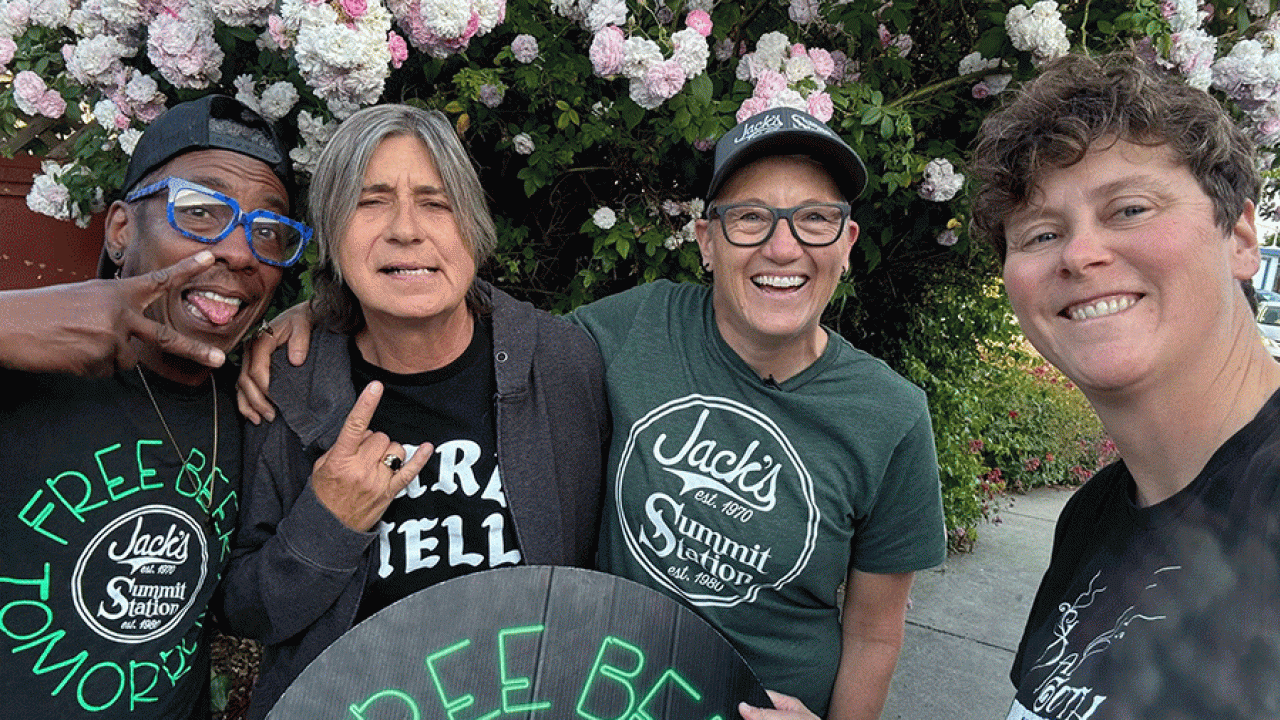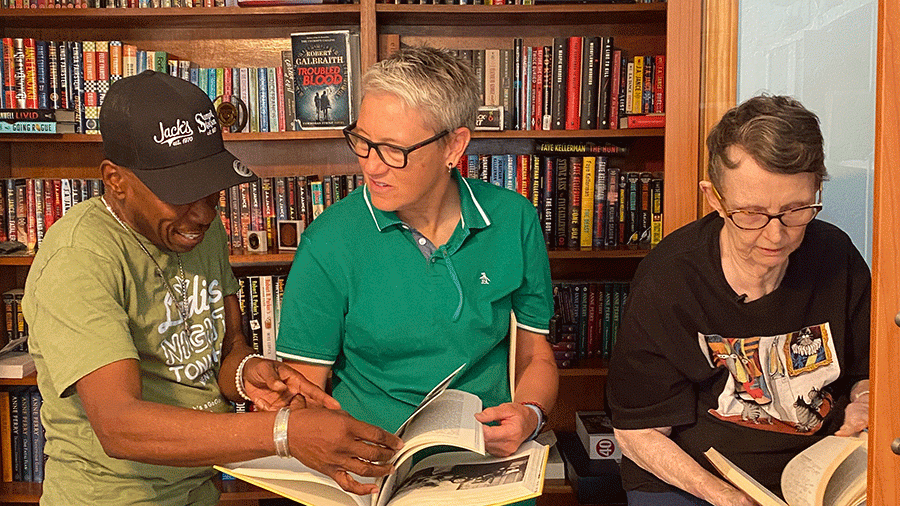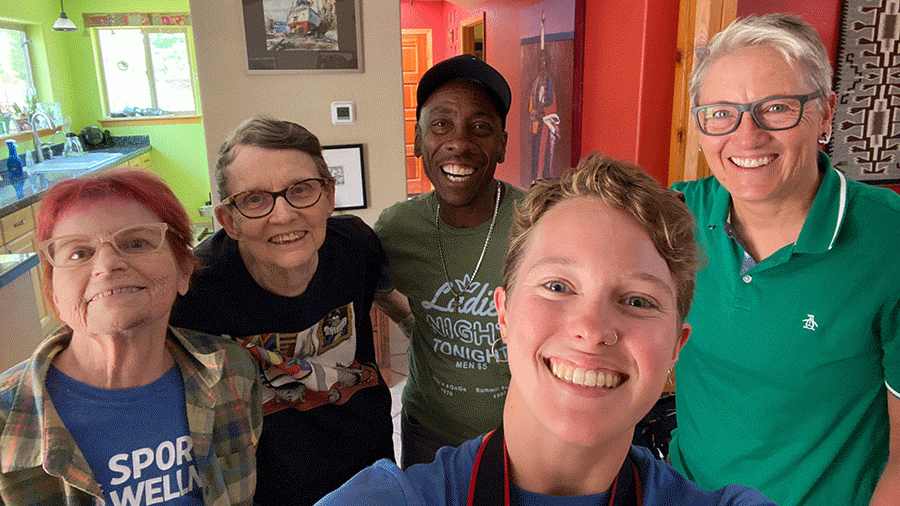From left to right, LuSter Singleton, Lynn Breedlove, a member of the band Tribe 8, Julia Applegate and Larin Sullivan, an LA-based filmmaker.
(All photos courtesy of The Free Beer Tomorrow project)

From left to right, LuSter Singleton, Lynn Breedlove, a member of the band Tribe 8, Julia Applegate and Larin Sullivan, an LA-based filmmaker.
(All photos courtesy of The Free Beer Tomorrow project)
Across the back wall of Summit Station, a bar once known as Jack’s, a neon sign declared: “Free beer tomorrow!” “The sign was on every day, so tomorrow never comes,” says Julia Applegate ’97 MA, ’20 MPH. “That's the joke, but not everybody gets it.”
In addition to memorable signs, Applegate, a senior lecturer in The Ohio State University’s College of Arts and Sciences, recognized there were strong community ties to this bar, located near Ohio State’s Columbus campus and open from the early 1970s until 2008. “I realized just how many stories were connected to that place, stories that needed to be preserved and shared,” she explains.
With LuSter Singleton ’94, ’97 MA, a retired health advocate and project manager, Applegate set out to do just that. Together, they went on a journey that would lead to a documentary film and research project supported by Ohio State’s Women & Philanthropy program.
The documentary, aptly called “Free Beer Tomorrow,” is in the editing stages and aims to capture the bar’s history. But Applegate and Singleton emphasize that the film examines more than just this establishment. “It is representative of what has happened in America with lesbian bars,” Applegate says.
In the early 1980s, there were over 200 lesbian bars across the country. Today, that number has dwindled to around 30, in part due to gentrification, opportunities to connect through social media and increased societal acceptance that empowers LGBTQ+ individuals to frequent more mainstream venues.
For decades, Jack’s/Summit Station wasn’t merely a social venue. It also functioned as what Singleton describes as a welcome center — where people could find community. “There was always somebody trying to get a job for someone, or helping someone secure housing,” he notes. It became a space for activism, particularly during the 1970s and '80s when more women were entering nontraditional blue-collar jobs.
While conducting interviews for the documentary, the pair found something troubling. Speaking with an 84-year-old former bar patron living alone on the East Side of Columbus, they saw the isolation affecting this woman who had once been an LGBTQ+ rights trailblazer.
“She won a lawsuit against her employer in 1975,” Applegate says. “The ACLU represented her against her union employer that fired her and her partner for being lesbians. In 1975. As a lesbian studying history, I thought, ‘We should all know your name, and we don’t and you’re lonely.’”
This account, along with others, prompted Applegate and Singleton to expand their project beyond the documentary. By conducting research, they could better understand the issue.

In addition to the film, “Free Beer Tomorrow” includes a podcast and public health research study. “We expect it to grow and encourage others to continue exploring other important aspects of our culture as time goes on,” Singleton says.
Women & Philanthropy funding awarded in 2024 provided computer software and compensation for the research team and participants. For Applegate and Singleton, this support has been crucial. “$42,000 for us is like $400,000 for the people who are in research labs at Ohio State,” Applegate says. "It’s just a massive influx of resources for us.”
Perhaps even more valuable has been the professional opportunity. “Because I don’t have a PhD, and I’m not typically a researcher, it’s enabling me to do research in a way that I’ve never done before," she says. Thanks to the collaborative relationship between Ohio State faculty and the central Ohio community, Applegate could flex her research muscles to bring the project to life.
For Singleton, the project has been a way to honor a space that served as a refuge during some of his darkest and most formative years. “When I was at Jack’s, I realized that there was a place for me. When I first moved to Columbus, things were very difficult for me as I navigated my own identity away from my family,” he says. “Jack’s/Summit Station gave me room to figure out who I am at my own pace, in an environment where it was safe to do so, in a time when it was definitely not safe to do that on the outside.”
The documentary, expected to be released in fall 2025, with its health research findings available early 2026, comes at a critical moment. Singleton sees the project as vital for passing on knowledge and fostering resilience.
“What I hope to accomplish is when someone goes to look for themselves, they find the documentary,” he explains. “I want people to know that it was more than just going to the bar. Real, concrete work that affected things on a national level happened here.”

For instance, attorney Rhonda Rivera, faculty emeritus in Ohio State’s Moritz College of Law, temporarily transforming the bar into an unlikely law office where civil rights arguments took shape amid the very community she was fighting to protect. Rivera’s legal expertise merged with grassroots organizing and shared experiences to become the foundation of the landmark civil rights work she would continue throughout her career.
With early documentary screenings already receiving standing ovations across central Ohio, “Free Beer Tomorrow” has the potential to serve as a bridge — helping younger generations understand these spaces’ importance while revealing resilience strategies from older LGBTQ+ people that could benefit other populations. “Our film will give people a vision for what they can do, how they can do it and how we survive.”
Women & Philanthropy at Ohio State is a collective of more than 200 donor members supporting research and scholarships at Ohio State through their cooperative giving. Membership is open to all.
This story covers grant award activity that took place before June 27, 2025, when Ohio Senate Bill 1 took effect.